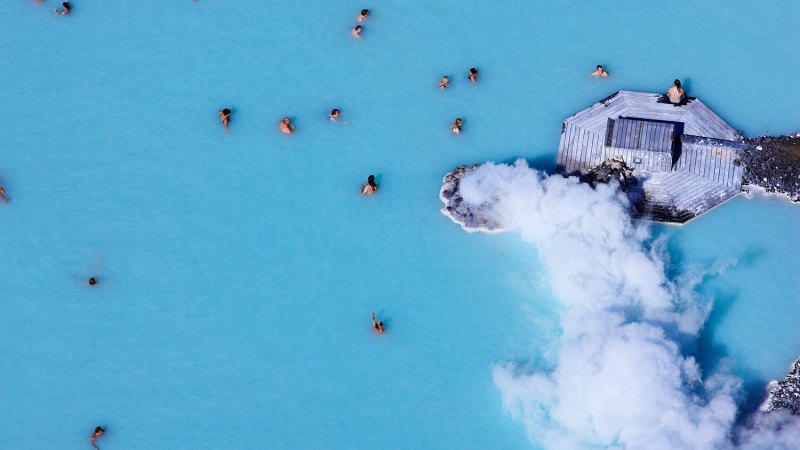Deep from within the cracks of the Earth, from volcanic bedrock and natural mineral deposits, flows the water of the best hot springs around the world. Infused with elements like iron, sulfur, and arsenic, our favorite hot springs offer therapeutic properties relied on by ancient civilizations for healing ailments. They also offer stunning views that seem to put the world back into perspective.

The best hot springs in the world
So pack your swim trunks and passport, because we’re taking you around the world to some of the best and most relaxing hot springs. Oh, and be sure to practice onsen etiquette for an enjoyable hot springs experience for everyone.
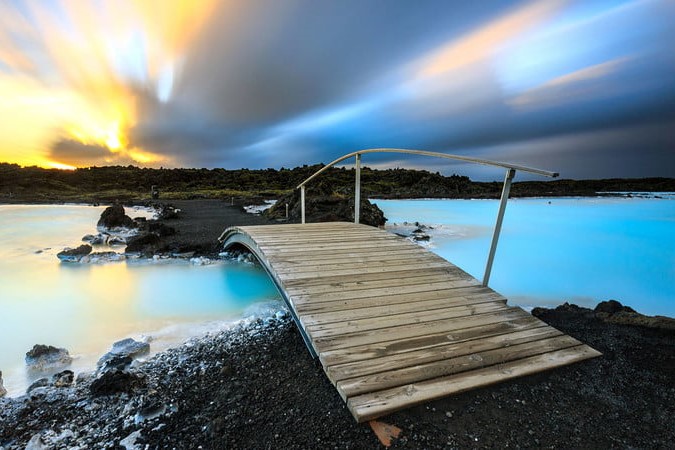
Blue Lagoon Geothermal Spa (Iceland)
You’ve likely seen Instagram shots of this ethereal icy blue heaven, where white steam rises from the vibrant water, closed in by black snow-capped rocks. Yes, the Blue Lagoon is one of those forever bucke -list items that travel enthusiasts need to experience first-hand. Booking is required to soak in these geothermal waters, which originate 1.2 miles below the surface where freshwater and seawater combine at extreme temperatures. On its way to the surface, the water picks up silica, algae, and therapeutic minerals, which account for the lagoon’s healing reputation, as well as its brilliant blue coloring.
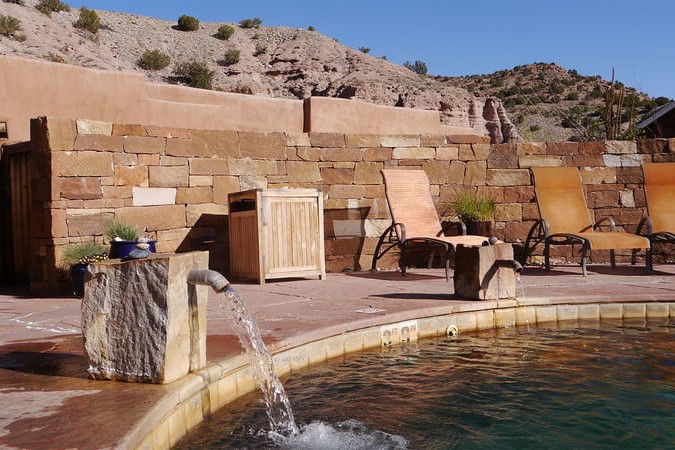
Ojo Caliente Mineral Springs (New Mexico)
Hidden within the hills of New Mexico is one of the oldest natural health resorts in the U.S., which was built around even older naturally occurring geothermal mineral springs that have flowed from a subterranean volcanic aquifer for thousands of years. More than 100,000 gallons rise to the surface each day, infused with four different types of minerals. These include lithia, iron, soda, and arsenic, all of which have purported healing powers. Unlike most natural springs, Ojo Caliente’s arsenic pool is also sulfur-free and is believed to be beneficial for relief from arthritis, stomach ulcers, and various skin conditions. Lithia water has been rumored to relieve depression and aid digestion, which means more Southwest food to go around!
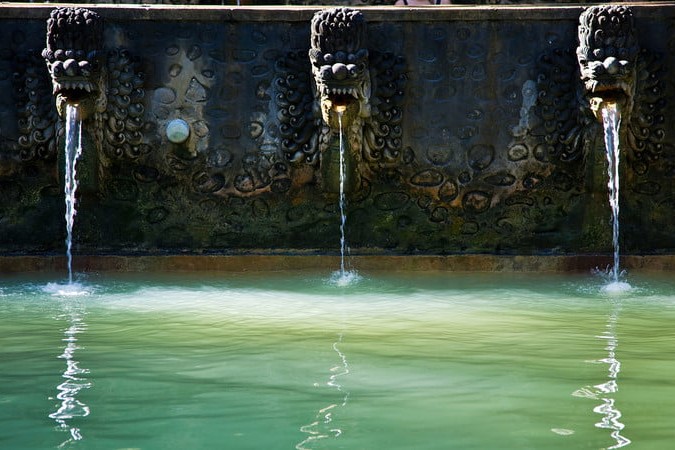
Banjar Hot Springs (Bali)
Air Panas Banjar, as the locals call it, is a hot springs complex that is surrounded by lush tropical gardens and a dreamy atmosphere. Nestled in the village hills of Banjar, natural hot spring water pours out of the stone-carved mouths of animal heads, filling a pool with what is considered “holy” water. This milky aqua hue overflows into a second and then third pool, where the current pummels down for a warm shoulder massage under the falls.
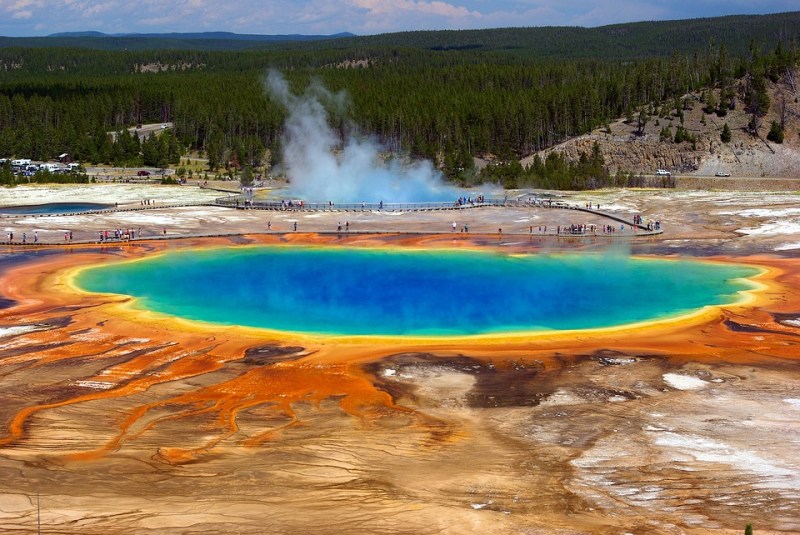
Grand Prismatic Spring (Wyoming)
As if Yellowstone National Park couldn’t get more picturesque, its Grand Prismatic Spring may be the most hypnotizing spring on the planet. It’s currently the largest hot spring in the United States and the third-largest in the world. The intensely bright bands of blue, green, yellow, and orange hues expand outward from the center in a gobstopper illusion that steams its own white clouds of fog. But fair warning: This isn’t a spring you’ll want to dip into, as extremely hot water travels 121 feet from a crack in the Earth to reach the surface. Still, it’s worth traveling to for a breathtaking view!
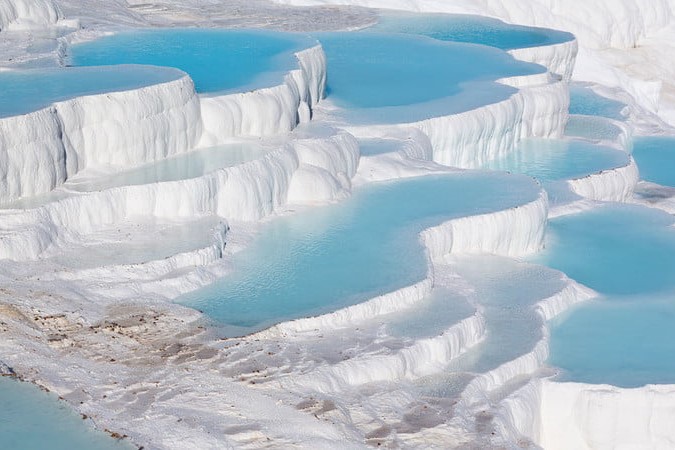
Pamukkale Thermal Pools (Turkey)
One quick glance at the Pamukkale Thermal Pools and you might think they’re just a bunch of glacial ice pools. But look a little closer, and you’ll find naturally formed travertine limestone terraces that have been built up over the past millennia. Filling these 17 tubs is hot (we mean hot) thermal water that resembles the color of pure turquoise. Though these pools are no longer open for relaxing, you can still walk around them, which is fine seeing as their temperatures range from 95-212 degrees Fahrenheit. Bring your trunks anyway, because a special swimming pool sits close to the terraces!
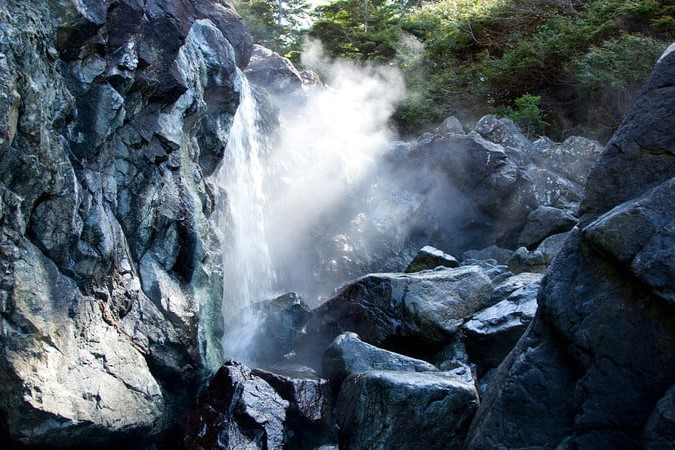
Hot Springs Cove (British Colombia)
If you think that a dip in a hot springs pool should be earned rather than given, then trek north to Hot Springs Cove, which is situated in the mountains of Maquinna Provincial Park. Hike for a half-hour through a dense forest to find this intimate hot springs, which is smack dab in the middle of nature. Each little pool is separated naturally by dark slate formations and is filled with crystal clear water bubbling up from the rocks. And if you check out the view of the Northern Clayoquot Sound, you might just spot whales, black bears, seals, sea lions, puffins, sea otters, and bald eagles!

Ma’in Hot Springs (Jordan)
The quality test of any hot spring is whether the locals go. And here, at the sprawling Ma’in springs, you’ll find both natives and tourists soaking away their ailments and worries in these beautiful pools. Fortunately, you can utilize a variety of routes to get to them, including some light climbing! These springs also contain elements like sodium, calcium, chloride, radon, hydrogen sulfide, and carbon dioxide, and can hit upwards of 145 degrees Fahrenheit. Located between Madaba and the Dead Sea, these crowning jewels of relaxation also consist of tall waterfalls that pour down into the pools (the heat of the water comes from the top of the basaltic mountain).

Cascate del Mulino (Italy)
With a welcoming and laid-back vibe, the free Cascate del Mulino springs have plenty of room (and parking) for all to join. The waterfalls are naturally brimming with sulfur and other minerals thought to cure ailments since the Roman era, and are situated just outside of the village of Saturnia. Great to visit no matter the season, these stairway pools get hotter the higher you sit and stream sparkling blue water that encompasses beauty and warmth. Just up the road, the same water bubbles into man-made pools at the luxurious Terme di Saturnia Spa, where you can see the thermal plankton micro-critters swimming about in the water.

Travertine Hot Springs (California)
One of the most iconic hot springs spots in the U.S. lies beyond a dirt path and the beat-up Jack Sawyer Road in California, and it’s the Travertine Hot Springs. It’s a staple for cross-country road trippers and solo adventurers alike, as it’s easy to get to and often frequented by travelers looking for a retreat. Surrounded by absolutely nothing but mountains, this geothermal pool is adequately named after the limestone deposited by hot mineral springs. Soak in here for a while, then emerge with greater blood flow, improved circulation, and a peaceful mind.

How are hot springs created?
The magic of hot springs lies in the Earth’s hidden heat and a clever dance of water and rock. There are a few ways in which they come about.
Source of heat
In volcanic areas, hot springs can be heated directly by shallow bodies of magma (molten rock), resulting in scorching temperatures. Even in non-volcanic regions, the Earth’s temperature increases with depth. This natural heat, known as the geothermal gradient, can also warm groundwater circulating deep down.
Hydrothermal circuit
The journey begins with rainfall or snowfall seeping into the ground. Then, through cracks and fractures, the water percolates deep into the Earth’s crust, where it encounters the heat source. Warmed by magma or the geothermal gradient, the water becomes buoyant and rises back toward the surface through faults and fissures.
Emergence and transformation
Reaching the surface, the hot water emerges as a spring, geyser, or fumarole, depending on the pressure and flow rate. Along its journey, the water dissolves minerals from rocks, giving hot springs their unique composition and potential therapeutic properties. As the hot water interacts with the cooler air, it may deposit some of its dissolved minerals, forming terraces, geysers, and other fascinating geological features. The temperature of hot springs can vary greatly, ranging from lukewarm to a scalding 200 degrees Fahrenheit.
